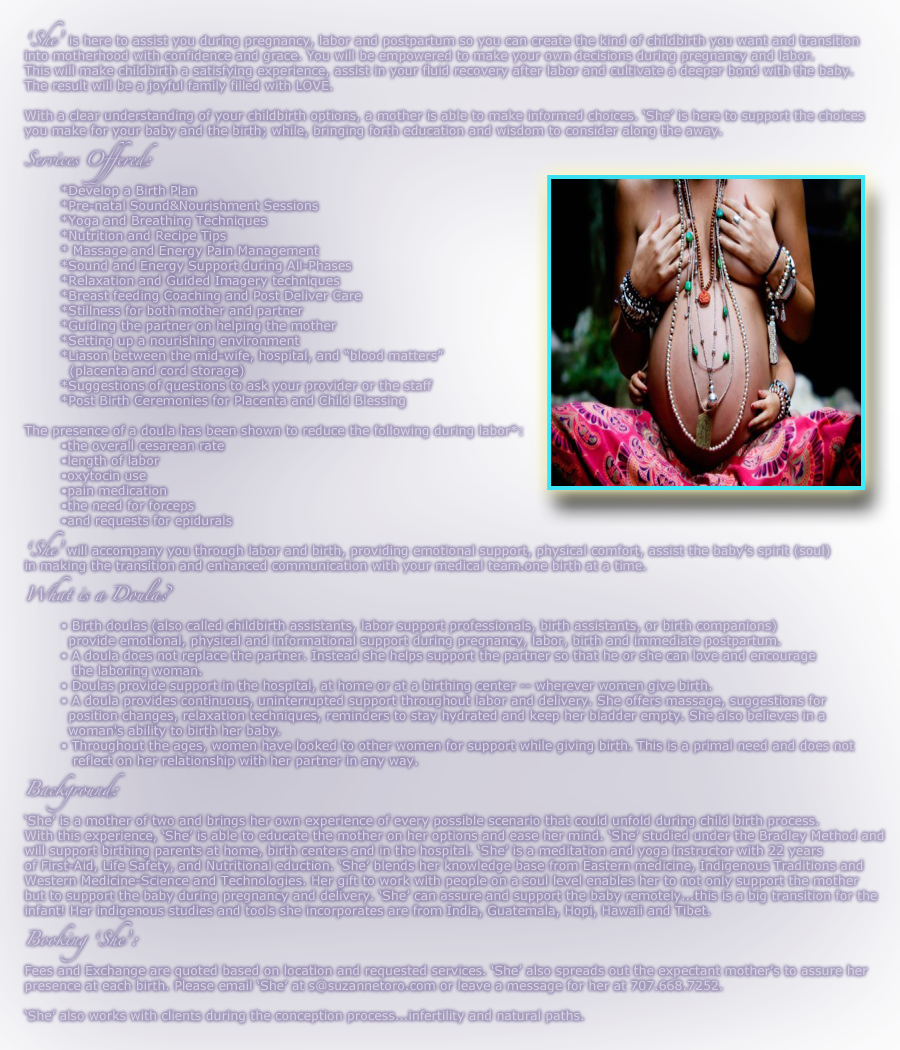

I Serve the Sacred Gateway of Birth
I honor the sacred gateway of birth and all the facets that surround it. Since 2010, I have been assisting mothers in preparing for pregnancy, birth, and postpartum. Additionally, I have personal experience as a mother, having given birth to and raised two children (born in 1999 and 2002) and endured the loss of three babies (in 2001, 2003, and 2005). With this collective experience as both a practitioner and a mother, I bring deep wisdom, compassion, and care to every mama and papa who is led to me for support—whether prior to conception, during pregnancy, at labor and delivery, and/or in the postpartum period. I hold the sacredness of welcoming a new baby into this world with a family as one of the most profound gifts I can offer.
Through my skills, I provide a unique level of support in both the physical and non-physical realms for the mother and baby. This approach offers them an opportunity to clear ancestral and karmic imprints that may release during pregnancy and birth. I also extend support to the father (or additional parent) throughout the birthing process, ensuring a holistic experience for the entire family.
Education and Training
Experience and Certifications:
- Ayurveda, Chinese Medicine, Psycho-Spiritual Therapy, Meditation, & Yoga: Studied with Dr. Deepak Chopra, MD, and Late Dr. David Simon, MD; 27 years of yoga studies (Hatha, Tibetan Dream, & Sound Therapy)
- Self-Studies: 30 years in Nutrition, Body Mechanics, and Mind, Body, & Spirit
- Instruction: Certified instructor for infants, children, and adults in Meditation, Yoga, Inner Wellness, Play, Art, Swim, Running, and Water Aerobics
- Bradley Birthing Method: Trained in natural childbirth techniques
- Way of Tea: Studied with Tea Master WuDe
- Thai Massage & Yoga Studies: Saul David Raye Certified in 2008
- Culinary Arts: 33 years of practice in Food Alchemy and global food studies
- Theta Healing: Certified in 2004
- First Aid & Safety: American Red Cross Water Life Safety Instructor
- Indigenous Studies: Explored traditions of Hopi, Mayan, Andean, Tibetan, Hawaiian, and Indian cultures
- Medical Intuitive: Trained in intuitive health practices
- Women’s Circles: Facilitator and participant
- Advanced Training in Medical Nutrition Therapy: Lincoln University College, Malaysia (2021)
- Primordial Sound Meditation Instructor: Certified in 2006
- Mind-Body Medicine & Ayurveda: Training completed in 2006
- Academic Degree: Bachelor of Science in Interior Architecture and Environmental Design, Arizona State University

Benefits of Having a Doula During Birth
1. Reduced Need for Medical Interventions
– Studies, such as those cited by the American Pregnancy Association and Evidence Based Birth, show that doulas are associated with lower rates of cesarean sections, epidurals, and other interventions. Continuous support can help labor progress naturally, reducing the likelihood of unnecessary procedures.
2. Shorter Labor Duration
– Research indicates that the presence of a doula can shorten labor by providing emotional reassurance and physical comfort techniques (e.g., massage, positioning), which may help the birthing person relax and cope more effectively.
3. Improved Pain Management
– Doulas offer non-pharmacological pain relief methods like breathing techniques, guided imagery, and sound/energy therapy. This can decrease reliance on medication and enhance the birthing experience.
4. Emotional Support and Reduced Anxiety
– A doula provides continuous emotional encouragement, helping the birthing person feel safe, heard, and empowered. This can lower stress levels, which is critical for a smoother labor process.
5. Higher Satisfaction with Birth Experience
6. Support for Partners
– Doulas guide partners on how to assist effectively, reducing their stress and enhancing teamwork during labor. This ensures the partner remains an active participant without feeling overwhelmed.
7. Lower Risk of Postpartum Depression
– The continuous support and postpartum follow-up often provided by doulas can ease the transition into parenthood, potentially reducing the incidence of postpartum mood disorders.
8. Breastfeeding Success
Doulas often offer breastfeeding coaching, which can increase initiation rates and duration of breastfeeding, according to organizations like La Leche League and research on early postpartum support.
9. Advocacy and Communication
– A doula acts as a liaison between the birthing person and medical staff, ensuring preferences (e.g., from a birth plan) are communicated effectively, especially during high-stress moments.
10. Cultural or Personalized Care
– Doulas can tailor their support to align with cultural practices, spiritual needs, or specific preferences (e.g., birth ceremonies or baby blessings), making the experience more meaningful.
Evidence:
A 2017 Cochrane Review of 26 trials found that continuous support from a doula was linked to a 39% decrease in cesarean rates, a 15% increase in spontaneous vaginal births, and a 10% decrease in the use of pain medication.

- Nutritional Support
- Meal Planning and Preparation: A postpartum doula often helps create nourishing meal plans tailored to the new parent’s needs, incorporating foods that support healing (e.g., iron-rich meals for blood replenishment, protein for tissue repair).
- Lactation Boosting: They provide guidance on galactagogues (e.g., oats, fenugreek) and hydration tips to enhance milk supply for breastfeeding parents.
- Cultural or Dietary Preferences: Doulas can adapt recipes to align with cultural traditions or dietary restrictions (e.g., Ayurvedic postpartum diets, vegan options).
- Education: They teach about nutrient-dense foods to combat fatigue and promote energy, critical in the early postpartum weeks.
- Breastfeeding or Feeding Assistance
- Latching and Positioning: Postpartum doulas offer hands-on coaching to improve breastfeeding technique, reducing discomfort and ensuring the baby feeds effectively.
- Troubleshooting: They help address common issues like engorgement, mastitis, or low supply, often preventing the need for medical intervention.
- Bottle-Feeding Support: For those using formula or expressed milk, doulas assist with preparation, pacing, and bonding during feeds.
- Confidence Building: Their encouragement boosts parental confidence in feeding choices, whether breast, bottle, or a combination.
- Physical Recovery Support
- Rest Facilitation: Doulas encourage rest by taking on light household tasks or caring for the baby, allowing the birthing parent’s body to heal from labor (e.g., vaginal tears, cesarean incisions).
- Pain Management: They may use techniques like warm compresses, gentle massage, or sound therapy to ease postpartum discomfort (e.g., afterpains, perineal soreness).
- Body Mechanics Guidance: Doulas teach safe ways to move, lift, or sit to protect healing tissues and prevent strain, especially after a cesarean or difficult birth.
- Monitoring Healing: They can spot signs of complications (e.g., excessive bleeding, infection) and suggest when to seek medical care.
- Emotional and Mental Health Support
- Postpartum Mood Support: Doulas provide a compassionate ear and practical coping strategies, reducing the risk of postpartum depression or anxiety by normalizing the emotional rollercoaster of new parenthood.
- Validation and Encouragement: They affirm the parent’s efforts, combating feelings of overwhelm or inadequacy during the vulnerable “fourth trimester.”
- Partner Inclusion: By supporting the whole family, they help partners process their own emotions, fostering a stronger support system.
- Household and Family Integration
- Light Housekeeping: Tasks like laundry, dishes, or tidying allow parents to focus on recovery and bonding rather than chores.
- Sibling Support: Doulas engage older children with activities or gentle guidance, easing their transition and reducing parental stress.
- Partner Empowerment: They educate partners on how to assist with recovery and baby care, strengthening family teamwork.
- Sleep and Energy Restoration
- Nap Opportunities: By caring for the baby during the day, doulas enable parents to nap, which is vital for physical healing and mental clarity.
- Sleep Education: They offer tips on establishing sleep routines for the baby and strategies for parents to maximize rest in short bursts.
- Energy Conservation: Doulas help prioritize tasks, ensuring parents don’t overexert themselves while their bodies recover.
- Customized Recovery Plan
- Holistic Healing: Many postpartum doulas integrate practices like belly binding, herbal baths, or energy work (e.g., Reiki) to support physical and spiritual recovery, tailored to the parent’s preferences.
- Postpartum Check-Ins: They assess progress and adjust support as the parent moves from immediate recovery (first 6 weeks) to longer-term adjustment.
- Resource Connection: Doulas link parents to professionals (e.g., pelvic floor therapists, lactation consultants) if specialized care is needed.
- Increased Confidence and Competence
- Skill-Building: From diaper changes to soothing techniques, doulas teach practical baby-care skills, reducing the learning curve for new parents.
- Decision-Making Support: They provide evidence-based information on postpartum choices (e.g., cord care, placenta use), empowering parents to make informed decisions.
- Long-Term Benefits: This early support often leads to greater self-assurance as parents transition out of the doula’s care.
I bring both personal and professional experience to supporting mothers and families as they process and heal from the loss of a child. From my perspective and understanding, your child enters your life at conception. No matter when the baby transitions—whether during pregnancy or after birth—they are your baby, and it is deeply important to grieve that loss for both yourself and your child.
